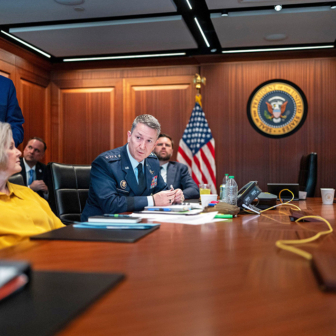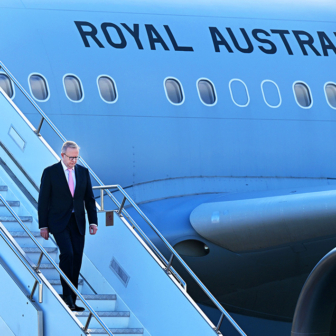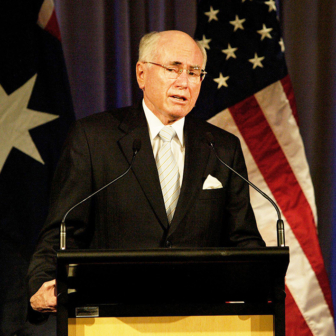It’s been a profound shock to the media — and not least to News Corp, whose journalists have been the preferred conduit for politically advantageous security and defence leaks under the Coalition government.
Little more than two weeks after an election result that News Corp had devoted so much reportage and comment to achieving, the media group found one of its star Canberra journalists subject to an Australian Federal Police raid on her home in search of leaked intelligence material and clues to its source.
“Outrageous,” said a headline in the Australian, above a story citing support from the kind of people the newspaper usually sneers at. That was just hours before a second raid that saw three AFP officers trawling through the emails and files on newsroom computers at the ABC’s headquarters in Sydney.
You don’t have to agree with former prime minister Paul Keating that the security and intelligence community has gone “berko” to have profound misgivings about where this is taking Australia. Suddenly, all the media are in the same boat — threatened with a drastic curtailment of freedom of inquiry and expression.
Home affairs minister Peter Dutton professed to have no prior knowledge of the raids by an agency under his recently created super-ministry. Prime minister Scott Morrison says everyone is subject to the law, so there’s nothing to worry about. The AFP insists the two raids were merely coincidental.
Yet the AFP is normally acutely sensitive to which cases its political masters want pursued vigorously and which they would prefer to be treated as too hard (wheat sales to Iraq, say, or Indonesian army culpability in the Balibo killings). It’s hard to believe it hasn’t been given a signal to go in hard.
The raids are aimed at finding and penalising those who leaked two matters of undoubted public interest and concern.
The first raid, on Annika Smethurst, the national political editor of News Corp’s Sunday tabloids, concerned a story based on leaked correspondence between Michael Pezzullo, secretary of the home affairs department, and Greg Moriarty, secretary of the defence department, about a proposal to allow the Australian Signals Directorate to collect domestic intelligence for the first time since it was created soon after the second world war.
The second, on the ABC, concerned 2017 news reports citing highly secret “Australian eyes only” intelligence that Australian special forces soldiers in Afghanistan may have deliberately or carelessly killed civilians. A week before the raid, former Australian military lawyer David William McBride was committed to stand trial in the ACT Supreme Court after being charged with leaking documents to the ABC.
It can be surmised that the source of the first leaks was deeply concerned about a fundamental shift in the power to invade the privacy of Australian citizens and enterprises in the name of national security. The leak headed this off, at least for the time being. In the second, the source was worried by a cover-up of possible war crimes that sully the reputation of Australia’s defence forces. A judicial inquiry is partly a result.
Defence and security agencies are right, of course, to try to protect sensitive information and investigate cases of disclosure. But their political masters need to balance those concerns with judgements about when to heed the message and not shoot the messenger. Unfortunately, balance isn’t in the nature of hardline former police officer Peter Dutton, the home affairs minister, or former state prosecutor Christian Porter, the attorney-general.
Evidence of Porter’s views came in June last year with his decision to pursue lawyer Bernard Collaery and former Australian Secret Intelligence Service officer “Witness K” over the disclosure that ASIS had bugged the Timor-Leste cabinet room during negotiations in 2004 about Timor Sea petroleum. The only possible reason for the attorney-general to risk more disclosures about this embarrassing episode is that he wants to crack the whip over Canberra’s bureaucracy to head off public revelations on the scale of Edward Snowden’s or Chelsea Manning’s intelligence dumps.
The raids come amid widening unease about other trends in the intelligence community. One is the expanding public profile of intelligence agency chiefs. ASIO director-general Duncan Lewis appears frequently in parliamentary committee hearings. In a departure from longstanding practice, the heads of ASIS and the Australian Signals Directorate have given speeches, and the latter even tweets.
Under Lewis, ASIO seems to be cooperating with a number of journalists and academics in pushing the notion of a great and imminent danger of subversion by China, requiring more powers and resources for security agencies. There is a high risk of jumping at shadows, or at the very least pre-empting cool analysis of how to mitigate dangers of using Huawei and other Chinese-made technology without derailing a crucial economic relationship.
As Richard McGregor, the Lowy Institute’s China specialist, has observed, ministers now casually claim to have seen intelligence material that backs their assertions. “Their offices are awash in it,” McGregor wrote earlier this year. “They are not shy in demanding the material, by all accounts. The green-marked briefs, indicating the material comes from ASIS, Australia’s mini-CIA, have apparently gained particular popularity.” Raw intelligence has never previously been allowed anywhere near political offices.
Tensions have also been created by the massive integration of the intelligence community carried out under Malcolm Turnbull, which centralised authority in the offices of Dutton and his ambitious department head, Pezzullo.
The exchange between Pezzullo and Moriarty reported by News Corp’s Smethurst reflects a battle for control of the ASD. The intelligence reorganisation saw the ASD made a statutory agency. Though it is still under the defence portfolio, home affairs has eyes on its intelligence-collection capabilities for domestic security. In addition, it has been given cybersecurity and cyberwarfare responsibilities. In January 2018, the Defence Force established a new signals intelligence and cyber command aimed at ensuring that “support to military operations remains the agency’s highest priority.”
Another side of the intelligence shake-up was the upgrading of the small Office of National Assessments, created in the 1980s on the recommendations of the Hope royal commissions, into the Office of National Intelligence. Under a new director-general of national intelligence, the ONI is supposed to coordinate the operations of all intelligence-collection agencies and give a daily intelligence brief to the prime minister. The new director-general is Nick Warner, who came straight from eight years heading ASIS.
Some senior former ONA officials see the new coordination function as simply mimicking Washington’s approach to “connecting the dots” after the 11 September 2001 failures, and as unnecessary in Canberra’s already close intelligence community. They worry this effort will divert attention and resources from the respected analysis function of ONA and erode the independence of reporting that successive directors have strongly defended.
While those in charge of these agencies are not “nutters,” as Keating also put it, there is a genuine cause for concern that security officials have too much policy influence in Canberra, that there is too much reliance on clandestine intelligence material instead of obvious open-source information, and that liberties are being too easily sacrificed.
It may take another Hope-style royal commission to address the first two concerns, and much stronger independent safeguards to address the third. •




